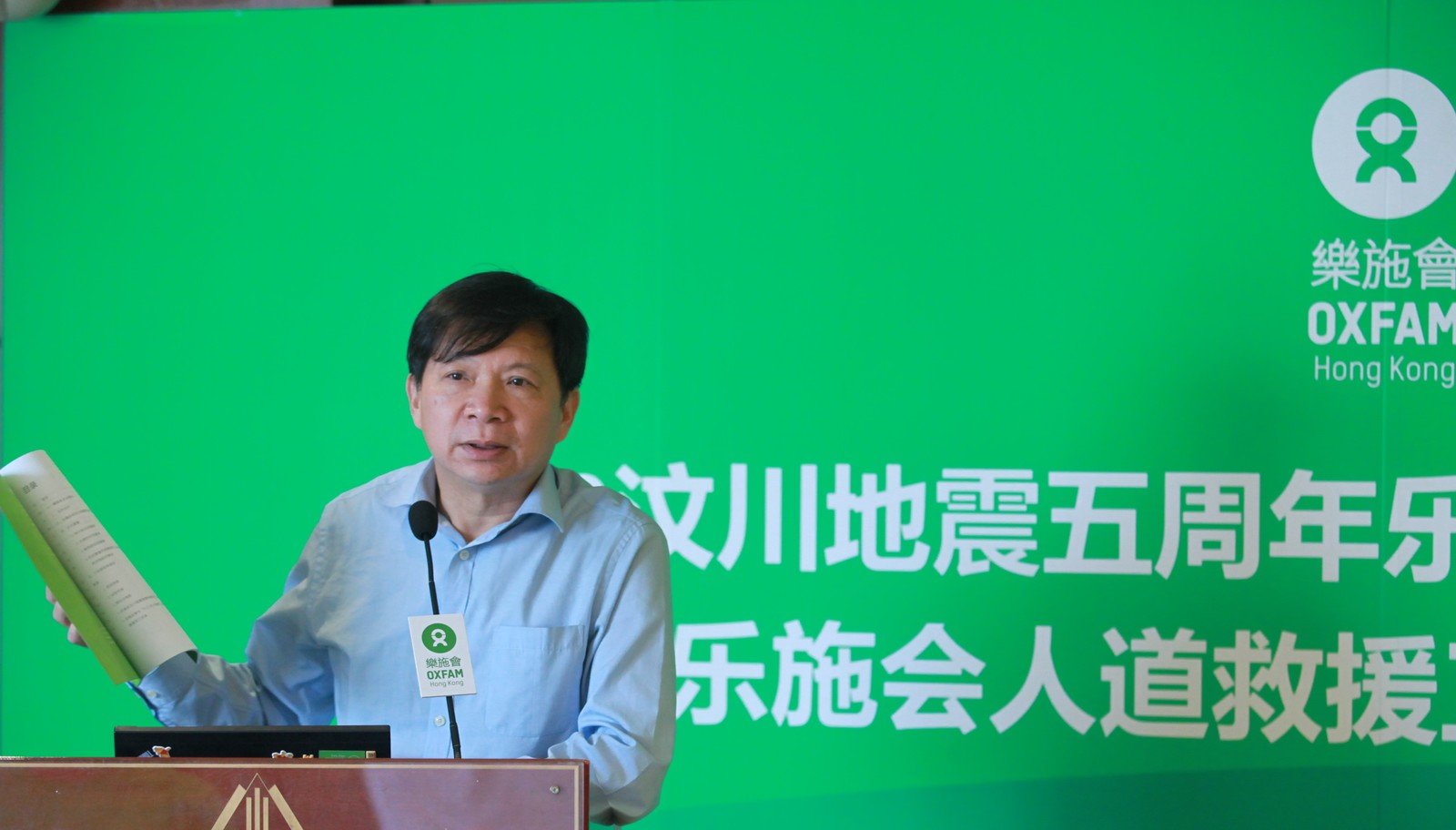17 APR 2013
Oxfam releases Wenchuan Earthquake Five-Year-On Report
Humanitarian work experience also shared at briefing session in Beijing
Marking the fifth anniversary of the 5.12 Wenchuan Earthquake, Oxfam Hong Kong held a sharing session in Beijing yesterday to introduce the reconstruction progress after the 5.12 earthquake and to share Oxfam’s humanitarian relief experience in Mainland China. At the session, Oxfam also released the "Humanitarian Relief Work Experience Sharing Report of Oxfam Hong Kong" and the "512 Wenchuan Earthquake Five-Year-On Report of Oxfam Hong Kong".
The devastating earthquake that struck Southwest China on 12 May 2008 killed 69,277 people and injured another 374,643. Direct economic loss is estimated at 845.1 billion yuan.
"Oxfam promptly responded to the emergency in Sichuan, Gansu and Shaanxi provinces after the earthquake happened. In the past five years, we have been working with 91 partners including government departments, local NGOs and research institutes to work on emergency relief and rehabilitation work in the affected regions. As of February 2013, Oxfam has contributed HK$166 million to 216 projects in the three provinces including 28 emergency relief projects and 188 reconstruction programmes, assisting over 850,000 people,” said Howard Liu, Director of China Programme, Oxfam Hong Kong.
Apart from responding to the Wenchuan earthquake, Oxfam also launched a series of humanitarian relief programmes in response to other disasters. "Over the six years from April 2006 to March 2012, Oxfam allocated 70.24 million yuan to 183 disaster relief programmes in the provinces of Sichuan, Yunnan, Guizhou, Gansu, Qinghai, Shaanxi, Hunan, Guangxi Zhuang Autonomous Region and Inner Mongolia Autonomous Region, in response to continued droughts in Southwest China, the 2011 Yunnan Earthquake in 2011, the 2010 Qinghai Earthquake and severe floods in Guizhou, Guangxi, Sichuan and Gansu. Over 1.39 million people received our assistance." said Dawn Li, Deputy Director of China Programme, Oxfam Hong Kong.
During the sharing session, Oxfam introduced some basic principles of humanitarian relief work, which are based on Oxfam’s past experiences in doing humanitarian relief work. These principles include:
- Using the most appropriate measure for each unique situation, responding to people’s basic needs
- Prioritising marginalised people and ethnic minorities
- Emphasising gender equality as well as the needs and participation of women
OHK focuses on assisting remote and impoverished villages and responds to different disasters with a multi-dimensional approach.
To maximise effectiveness and reach of the emergency relief programmes, Oxfam uses a participatory approach which involves the whole community and stresses the importance of building up partnerships. In the process of programme implementation, Oxfam encourages the engagement and participation of the community, from the project design stage to the actual execution. The participation of the community can facilitate project assessment and distribution of relief supplies.
Furthermore, Oxfam stresses efficiency and accountability in disaster relief. Efficiency and timeliness are fundamental requirements in emergency relief work. Oxfam normally manages to complete an emergency response plan in one to two weeks, including disaster assessment and relief supplies distribution. Oxfam places high importance on transparency and communicates, on a regular basis, with the Council, the public, donors, partners and beneficiaries about our work impacts, financial audits and so on. By demonstrating accountability and appropriate use of donations, the agency can gain support and trust from the public.
When implementing emergency response, Oxfam adheres to the codes and standards of the international confederation Oxfam as well as international humanitarian relief standards, They include “The Sphere Project – Humanitarian Charter and Minimum Standards in Humanitarian Response”, “Code of Conduct for the International Red Cross and Red Crescent Movement and NGOs in Disaster Relief” and the “Humanitarian Accountability Partnership Standard”.
The Sphere Project was initiated by a group of humanitarian NGOs including Oxfam, the International Red Cross and Red Crescent Movement, aiming to improve the quality of their actions during disaster response and to be held accountable for them. The Sphere Handbook is a widely known and recognised set of common principles and universal minimum standards for humanitarian response. Oxfam has been participating in the updating of the Handbook, which was originally published in English, then adapted to different languages. With the endorsement by the Sphere Project, Oxfam took up the task of translating and publishing the Simplified Chinese version of the Handbook. At the sharing session today, Oxfam formally introduced the Simplified Chinese version of the Sphere Handbook, hoping to further advocate the minimum standards in humanitarian response in Mainland China.
Download the “Wenchuan Earthquake Five Years On” report here.
-End-
For media enquiries, please contact:
Sarah Chu
Communications Officer
Telephone: + 852 3120-5280 / + 852 9276 0064
Email: sarah.chu@oxfam.org.hk
About Oxfam
Oxfam is dedicated to fighting poverty and inequity worldwide. The international and independent development and humanitarian organisation tackles poverty in four main ways: sustainable development in poor communities, disaster relief, local, national and global advocacy, and education with Hong Kong youth. Established in Hong Kong in 1976, Oxfam Hong Kong is a founding member of Oxfam, an international confederation that has assisted poor people in 94 countries. Oxfam Hong Kong alone has supported poor people in over 70 countries/regions.

